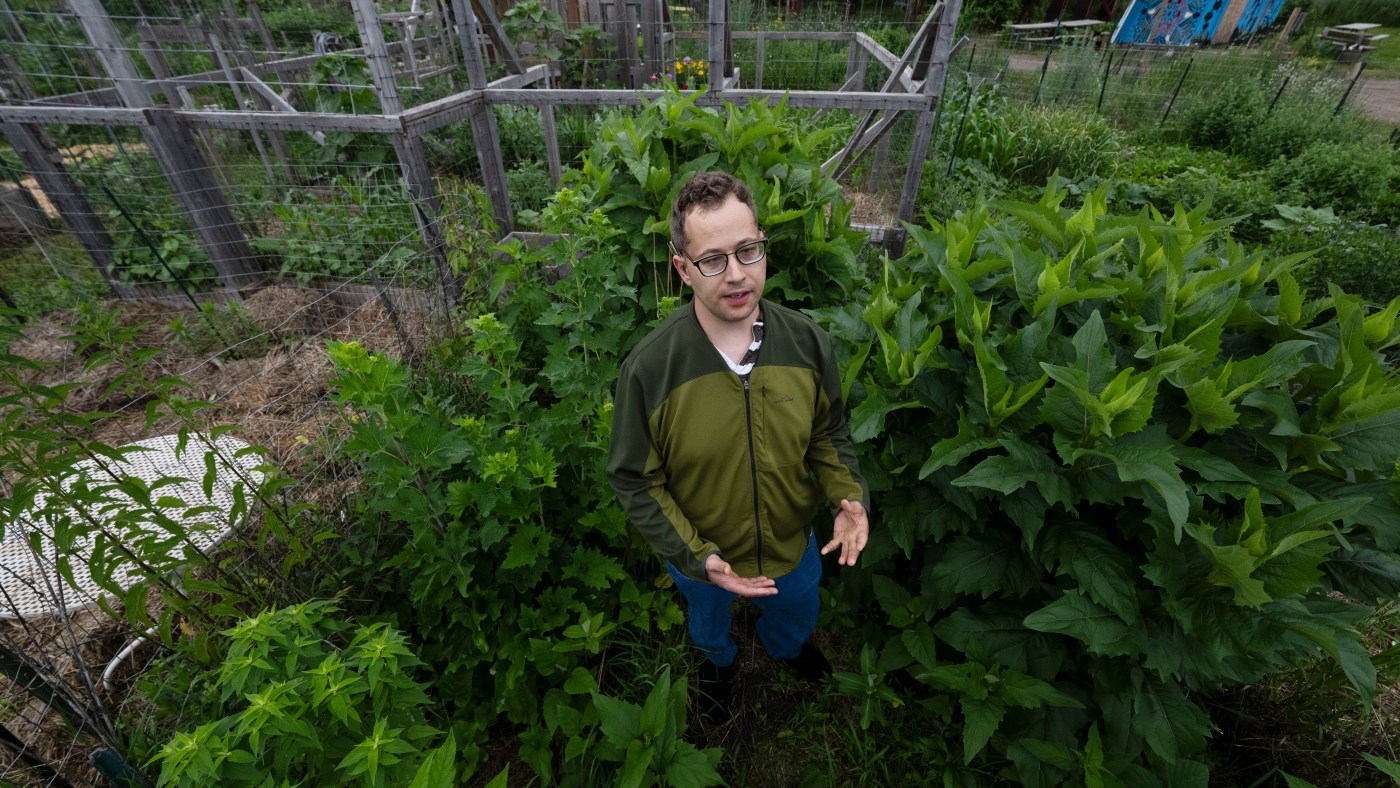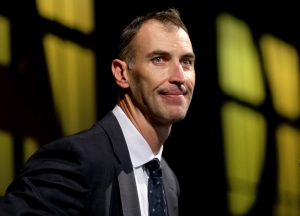
For a St. Paul gardener with high-functioning autism, a Merriam Park community garden has been his home away from home
Alex Junge yanks at the Creeping Charlie growing on the side of a garden plot overlooking Interstate 94 in St. Paul’s Merriam Park. The fast-growing weed isn’t native to Minnesota, though it’s made itself at home for centuries, he explains. Beer-drinking European explorers likely introduced the invasive pest in the mid- to late 1600s as a clarifier before the widespread use of hops.
“It was actually brought to Minnesota by the Saxons,” said Junge, waxing philosophic about his relationship to the hardest-to-love flora. “It’s all about control. It’s never about elimination.”
With something akin to boyish enthusiasm, Junge, 37, walks through the Merriam Station Community Garden pointing to juicier neighbors: a budding peach tree, a plum tree that will soon follow, an apple tree down the hill. There’s a tall white oak almost as old as the state itself, and another a short trek to its west. One of his edible garden plots grows peppers, tomatoes and someday grapes — give that effort a couple more years — while his second plot is home to all sorts of native wildflowers: Honeyberry, Wild Bergamot, the Cup plant, the Prairie Dock, the Pale Indian Plantain, the Coneflower and even the Maximilian sunflower, which could someday reach his own height, or taller.
The busy clatter of I-94 from downhill, beyond the Gilbert Avenue frontage road, doesn’t bother him any more than the railroad tracks off Prior Avenue to his east. With or without his two hearing aids, Junge, who grew up in Highland Park, is much more attuned to the sound of progress, evident in the buzzing from three manmade beehives that draw bees by the hundreds, if not thousands, the work of an ambitious fellow gardener-turned-beekeeper. He dare not stand too close, but even from several yards away, the swarms are a sight.
Alex Junge examines a milkweed plant in his plots at the Merriam Station Community Garden in St. Paul on Thursday, June 20, 2024. The garden has become a second home of sorts to Junge, who has Asperger’s syndrome — a neurodevelopmental disorder — after his personal care attendant in high school introduced him to the generous world of plants at a time when not everyone was as emotionally generous toward his autism. (John Autey / Pioneer Press)
Progress also is evident in the plastic tarp, measuring some 75 feet long and 30 feet across, held down by bricks along the hill slope. It will take a year to kill the grass beneath it, and even more weeding and hoeing to ready the earth for a community wildflower planting that Junge, a lead organizer of the effort, can’t wait to be part of.
Gardening through difficult times
Established by diehard volunteers 12 years ago on and around a sloping embankment overlooking the deep trench of the interstate, Merriam Station has grown to become one of the more sizable community gardens in St. Paul, hosting 100 plots and nearly 200 members dedicated to organic and environmentally sustainable gardening.
It’s also become a second home of sorts to Junge, whose personal care attendant in high school introduced him to the generous world of plants at a time when not everyone was as emotionally generous toward his autism. Junge, who has Asperger’s syndrome — a neurodevelopmental disorder — has used his gardening skills to green the back yard of the small group home he’s lived in for the past 13 years on St. Paul’s East Side.
Gardening has helped him through the difficult times, like the death last year of his roommate, a man he refers to only as Casey, to cancer.
The community garden has helped others, too.
At the far east end of the Merriam Station plots, just off Prior Avenue, a memorial garden hosts a plaque to a member’s grandson — Alan Geisenkoetter Jr., an 8-year-old killed in 2018 when a repeat drunken driver ran a snowmobile through the portable ice fishing house that Alan’s father had been setting up on a Chisago County lake. Alan — who was airlifted with head injuries to Gillette Children’s Specialty Healthcare in St. Paul — spent five days in critical condition before dying of wounds his family said at the time were far more grave than initially suspected.
“The whole community came together to make that garden,” said Junge, who knows the well-tended flower garden as “The Little Alan Garden.” During Sunday evening get-togethers around the fire pit, members socialize and strategize about more projects to come.
A range of talent
While weeding at the memorial garden, garden coordinator Noah Kurth said he appreciates Junge’s depth of knowledge about plants and insects, and his willingness to lend a hand where needed.
Junge is equally appreciative of Kurth.
“He’s a nice guy who can grow a really, really big beard when he wants to,” he explained.
Merriam Station draws a wide range of gardening talent, including newcomers to the field, and a waiting list. Sometimes it’s best to let people make their own mistakes, offering guidance if and when they’re open to it.
“We’re not a fan of micromanaging people’s plots,” Kurth said.
Alex Junge shows a flower in his plots at the Merriam Station Community Garden in St. Paul on Thursday, June 20, 2024. (John Autey / Pioneer Press)
As Junge walks along the memorial garden’s curb, near the driveway turn-around where a personal care attendant waits in a van to drive him back to his group home, Junge yanks at Spotted Knapweed, one of the more deceptively attractive and preternaturally aggressive of the invasive weeds. Anything worth loving is worth protecting, or so gardening has taught him.
‘Seeing things grow’
Junge, who holds a part-time job in the winter months as a kitchen helper at the University of St. Thomas, calls the university “a fun place.”
Still, standing at the edge of what once had been an unofficial dumping ground off the highway frontage road, Junge looks out at what now may be the closest thing to his nirvana.
“I like seeing things grow, seeing things thrive, seeing bees come back, seeing birds come back, and the community come back,” he explained. “This is a really, really cool place.”
Related Articles
Anthony Frattalone: My son saved my life: a cautionary boating tale
Joe Soucheray: Fraud after fraud, precious millions flushed, and precious little accountability in Minnesota
As rivers rise, Stillwater and St. Paul prepare for flooding
Raihala: Lori and Julia made magic together on radio and they will be missed
Seeking an antidote to gun violence, a St. Paul church will help turn firearms into gardening tools


